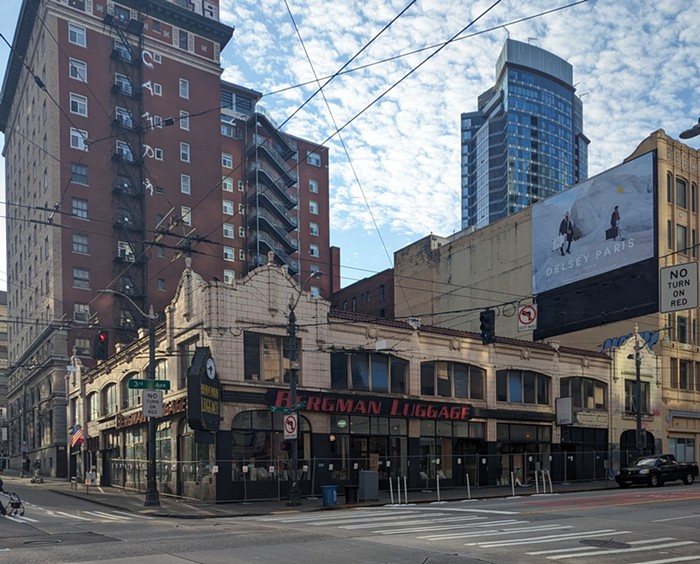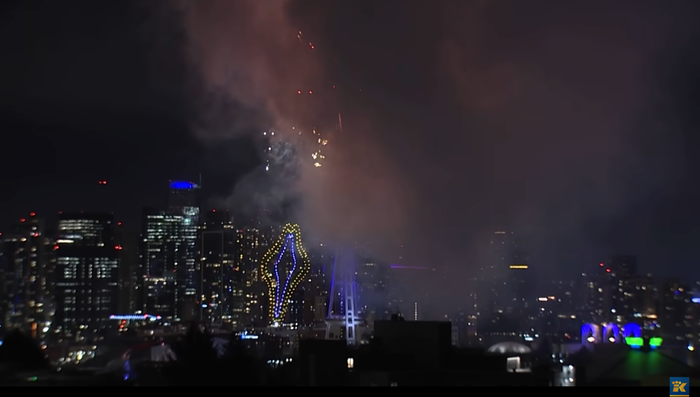
Over the next few years, streets across Seattle could banish cars and replace them with street cafes, a transformation that could get underway sooner than you think. There’s just one thing standing in the way.
“The barrier to making this happen tomorrow is making sure everyone’s on the same page,” says Councilmember Dan Strauss, who helped champion legislation that will extend the “temporary” cafe permits through next year with an eye to making them permanent.
At the beginning of the pandemic, Seattle lagged behind some other cities in switching street priorities from cars to people.
But very gradually, the city managed to rehabilitate pavement that for years had been sludge-packed with cars, and now pretty outdoor pergolas dot former traffic sewers around town. It’s a reform that should have happened years ago. And it’s not enough.
Seattle’s not doing nothing. For now, permits are free, which helps. But when I reached CM Strauss by video, he was standing in the midst of wooden pergolas on Ballard Ave and pointed out that “there's tens of thousands of dollars worth of lumber here. Right now there’s not a specific program for support other than the small business stabilization grants.”
As Eladio Preciado, owner of Julia’s on Broadway, pointed out to me recently, many businesses are struggling to stay alive and can’t afford to launch into a costly construction project. New Orleans is offering outdoor dining grants to small businesses, and Chicago’s tourism bureau will provide funding guidance. Seattle should do the same.
But just making Seattle’s permits free was a complicated process, Strauss pointed out, because the division of SDOT approving these permits is funded by the fees that small businesses pay. That division ran a heavy deficit last year to help businesses survive. (Federal money could help fill the department’s 2020 funding crater.)
What’s more, those fees are based on the number of parking spaces that outdoor dining spots take up — but “that equation doesn’t take into account the public good of having an active street,” Strauss says, or the sales tax revenue that pedestrians are likely to generate. Figuring out what fee actually makes sense is just one project for the coming year.
Aside from providing funding help, Seattle should be doing more to help businesses build more cafes. San Jose provides free barriers and installation — Seattle should do the same. Chicago is working with a chamber of commerce to install pedestrian-scale lighting — Seattle should do the same. The National Association of City Transportation Officials recommends having an on-call contractor that businesses can call on for construction services. Seattle should do that.
And that’s just the tip of the iceberg. Portland’s converting entire streets to outdoor dining spots. Brookline extended their sidewalks, Oakland lowered speed limits, Montreuil created safer crossings, Madison built pop-up bike lanes, Dallas let merchants build outdoor markets, Burlington established voting stations. Seattle should do all of that.
These aren’t impossible dreams, or even necessarily in the far-off future. It took just a few weeks for dining areas to become a normal part of the city landscape, miraculously avoiding the notoriously decades-long Seattle Process — that is, “seeking consensus through exhaustion," as Seattle Weekly once put it.
CM Strauss credits SDOT’s Public Space Manager Alyse Nelson for moving fast. “I refer to her as the public space wizard,” he says, swinging his phone to look from one side of Ballard Ave to the other. “One reason SDOT didn’t have permanent regulations in place right now is she had her team focused on getting permits out the door, and that was the right goal.”
Now that the temporary permits are secure for at least another year, now’s the time to start planning more improvements like these. The next year of discussions could determine what Seattle streets look like for years to come.
“I want to see what’s happening on Ballard happening all over our city,” Strauss says.



















